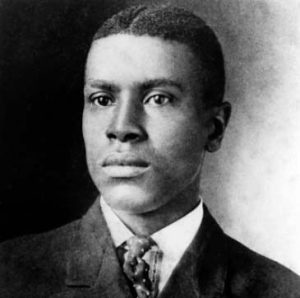 Oscar Micheaux and the Birth of Black Independent Cinema, an 18-film festival, including 7 new restorations, of work by the prolific independent director whose pioneering explorations of contemporary Black life paved the way for generations, will run at Film Forum from Friday, May 3 through Thursday, May 9.
Oscar Micheaux and the Birth of Black Independent Cinema, an 18-film festival, including 7 new restorations, of work by the prolific independent director whose pioneering explorations of contemporary Black life paved the way for generations, will run at Film Forum from Friday, May 3 through Thursday, May 9.
Operating on shoestring budgets, Oscar Micheaux (1884-1951) directed and produced more than 40 films between 1919 and 1948, shifting from silent to talkies, and depicting such complex and taboo subjects as religious hypocrisy, interracial marriage, police violence, and lynching, often with all-Black casts and producers. His work explored the Black experience with nuance and depth, often challenging the negative stereotypes so commonly portrayed in films of the era. Micheaux’s films were the first made by a Black filmmaker to be shown in white cinemas, and they were often hugely successful, with Micheaux working directly with theater owners to finance, distribute, and market them.
Born to formerly enslaved parents in 1884, Micheaux moved to Chicago from a small town in Illinois and took on work shining shoes and laboring in the meatpacking and steel industries. He later worked as a porter for the American railway system, which allowed him the stability to travel, save money, and make connections with wealthy people who would help finance his films. In 1904, he moved to South Dakota and became a successful homesteader among a predominantly white, blue-collar population. Micheaux began writing about his experiences on the frontier, submitting articles to the press, and writing his first novel, published in 1913, The Conquest: The Story of a Negro Pioneer. The novel attracted the attention of a Los Angeles production company, which offered to adapt the book into a film, but Micheaux’s commitment to being directly involved with the film’s production dissolved their negotiations, and he went on to produce the film himself. The Homesteader, released in 1919, is now considered lost, along with most of Micheaux’s silent work.
He followed his successful debut with the drama WITHIN OUR GATES (1920), featuring “race film” superstar Evelyn Preer as an educated Black woman who gets swept up in the Great Migration from the rural South to the big city, and dedicates herself to helping a near bankrupt school for impoverished children. Micheaux’s earliest surviving feature – and of any African American director – is considered his most provocative, controversial film, with sequences deemed so incendiary that the film was repeatedly cut by censors, until the Library of Congress restored the film as close to the original as possible in 1992.
The great stage actor Paul Robeson appeared on the screen for the first time in Micheaux’s BODY AND SOUL, a 1925 silent film that showcased his versatility and charisma in a dual role as an escaped convict and the Right Rev. Isiaah T. Jenkins. It is the only film Robeson made with an African American director. Alice B. Russell, the actress, producer, and Micheaux’s second wife, played a large part in the professional life of her husband, starring in several of his films – THE GIRL FROM CHICAGO (1932), MURDER IN HARLEM (1935), and GOD’S STEPCHILDREN (1938) – as well as helping to run his production company, Micheaux Film Company.
The series includes new restorations of seven of Micheaux’s films: WITHIN OUR GATES, THE SYMBOL OF THE UNCONQUERED, BODY AND SOUL, GOD’S STEP CHILDREN, VEILED ARISTOCRATS, MURDER IN HARLEM, and THE NOTORIOUS ELINOR LEE. Previously circulated theatrically only in poor-quality prints, these newly restored versions allow us to witness the great legacy of Oscar Micheaux with fresh eyes.
Artist, archivist, and series consultant Ina Archer will appear to introduce the Friday, May 3, 6:00 PM show of BODY AND SOUL, with live piano accompaniment by Steve Sterner.
The Saturday, May 4, 4:00 show of WITHIN OUR GATES and the Monday, May 5, 6:50 show of SYMBOL OF THE UNCONQUERED will also feature live piano accompaniment by Steve Sterner.
Archer and composer/multimedia artist/writer Paul D. Miller aka DJ Spooky will appear for a conversation following the Saturday, May 4, 7:40 PM show of BODY AND SOUL, with a live score performed by DJ Spooky.
This series is dedicated to the memory of author, filmmaker and historian Pearl Bowser (1931-2023), an early champion of rediscovering Micheaux’s work. On Sunday, May 5 at 2:00 PM, artist and activist Ina Archer and Gillian Bowser, Pearl’s daughter, will present “A Tribute to Pearl Bowser,” including films she discovered, her own short films, and an interview made for Film Forum in 2019.
